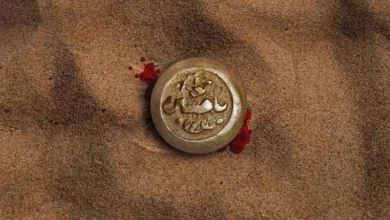Reality of hadees Manzila“Position Of Moula Ali as”

Hadees Manzila’s Background
The comparison between Muhammad (P.B.U.H.) and Ali, is like Musa, and Harun is one of the most striking. Its repetition shows the connection between all four personas and denotes its significance. Hadees Manzila is the popular name for the Hadith. As recounted by Imam Hakim in Al-Mustadrak ala al-Sahihain, Volume 2, page 337: “This Hadith has been conveyed by a great number of Sahaba to the extent that it has acquired the level of being a Mutawatir Hadith, i.e., a Hadith related by consecutive chains.”
Hadees Manzila clearly indicates khatme nabuwwat
We can see that the Sunni Ulema included this Hadees among the appreciated merits of Ali (A.S), and would identify this as one of his greatest virtues, despite the shameless Nawasib, such as ibn al Hashimi, insisting that no credence should be given to this Hadees and it bears nothing of value.
Hadees Manzila, is preserved in Sahih Muslim Book 031, Number 5915, in the context of a conversation between Sad and Muawiyah:
There is a narrator for Hadees Manzila, With the same network of transmitters and on Shu’ba’s authority. When asked what keeps him from mistreating Abu Turab (Hadrat ‘Ali), responded, “Three things that I remember Allah’s Messenger (may peace be upon him) having said about him. And even if I find one of those three things for me, it would be more dear to me than the red camels.
” This information was given to Amir bin Saad b. Abi Waqqas on the authority of his father. As Ali left behind Haroon during one of his expeditions (that was Tabuk), I overheard Allah’s Messenger (May peace be upon him) mentioning Ali. Allah’s Messenger, you leave me behind along with women and children, they all cried out to him.
Then Allah’s Messenger (Peace be upon him) asked him, “Aren’t you content with becoming to me what Haroon was to Mossa, except that there is no prophethood after me”? On the Day of Khaibar, he also said something I overheard: “I would gift this standard to someone who loves Allah and his Messenger, and Allah and his Messenger also love him.” We had been anticipating it when he (the Holy Prophet) ordered, “Call Ali,” the narrator remarked.
When he get to know that his eyes were red. He gave him the standard and rubbed saliva to his eyes before Allah granted him victory. The (next) line, “Let us summon our children and your children,” was revealed this third time. Ali, Fatima, Hasan, and Husain were called by Allah’s Messenger (may peace be upon him), who said: “O Allah, they are my family.”
Examining Hadees Manzila’s meaning
Examining the link between Harun (A.S.) and Musa (Moses) (A.S.) in the Quran
The Prophet (PBUH) is said to have said to Ali (A.S): “Your status to me is like the position of Harun to Musa (Moses), except that there would be no prophet after me,” according to Sahih Bukhari.
What, therefore, was the connection between Muhammad (P.B.U.H) and Ali (A.S.), Harun (A.S.), and Musa (Moses) (A.S.)? Given that the whole Prophethood frequently recalled this simile, there must be some similarity; it must be significant.
The Prophet (PBUH) made reference to a relationship that persisted after his (PBUH) lifetime when he said: “Your position to me is like the position of Harun to Musa (Moses), except that there will be no prophet after me.” This must have something to do with the future of Islam, as it was frequently stated.
The Hadees Manzila combines quite distinct historical eras; as history is a science, it needs to be investigated. We must establish these linkages in order to compare (similarities) and contrast (differences) throughout the time the Prophet (P.B.U.H) suggests this relationship.
There were several differences between Harun (A.S) and Ali (A.S).
Ali (A.S.) was younger than the Prophet (P.B.U.H) and Harun (A.S.) was older than Musa (Moses) (A.S.).
While Ali (A.S) outlived the Prophet (P.B.U.H), Harun (A.S) passed away before Musa (Moses) (A.S).
These are insignificant distinctions; the contrast is meaningless if we have proof that Harun (A.S) was chosen as his successor at a time when he had abandoned his people. One must study the Quran in depth to comprehend the parallels.
It is interesting to note that those Nawasib who insist that everything must have Quranic support as proof fail to do so when it comes to Hadees Manzila, instead choosing to use false Qiyas to interpret the Hadees in a way that defends their doctrine of a man-made Caliphate and denigrates Maula Ali (A.S).
We would have found the solution to our query regarding the significance of Hadees Manzila if we are able to comprehend this relationship, which will undoubtedly allow us to comprehend the relationship Ali (A.S) had with Muhammad (P.B.U.H). The Qur’an makes This link clear, as it is with so many other situations. Let’s look at the connection between Harun (A.S.) and Musa (Moses) in the Quran.
Proofs from Quran:
First connection: According to The Qur’an (19:53), Musa (Moses) (A.S.) had a brother named Harun who was provided to him out of pity.
The Prophet (PBUH) and Ali (A.S.) shared exactly the same bond. Due to his perfection, the Prophet (P.B.U.H) followed this directive and declared Ali (A.S), his first cousin and son-in-law, to be his brother in terms of proximity, just as the Hadees Manzila, states.
Second connection: Harun (A.S.) served as Musa (Moses) (A.S.)’s vizier.
The Quran declares that Harun (A.S) was the vizier of Musa (Moses) (A.S), and it obliges us to believe that Ali (A.S) and Muhammad (P.B.U.H) have this same relationship. At the start of his mission, the Word of Allah declares that Harun (A.S) was appointed as Musa (Moses) (A.S)’s vizier.
To lessen his load, Musa (Moses) (A.S.) asked Allah for a vizier. “Musa (Moses) said: O Allah! Give me my brother Harun, a Vizier from my family, as a Wasi. Increase my strength through him, and have him share my responsibility so that we can joyfully celebrate your Honour. “We granted your wishes, O Musa (Moses),” (Allah) replied. (20:29-36)
Musa (Moses) does not confine himself to speaking about wazirate alone but rather alludes to a consolidation of his might and an alliance with him in his concern,” al Mawardi argues in his commentary on this verse.
In the Quran, the relationship is further explained: “And certainly, we gave Musa (Moses) the Book, and We appointed Harun (AS) with him as an Apostle and his Vizier.” (25:35).
Are there any further comments that need to be made? Both Hazrat Mohammed (P.B.U.H.) and Hazrat Musa (Moses) (A.S.) received the Book from Allah (S.W.T.). Musa (Moses) (A.S.) appointed Harun (A.S.) to the positions of Prophet and Vizier. The Prophet (P.B.U.H.) and Ali (A.S.) are said to have the same connection, according to the Hadees Manzila.
Third relationship: During his lifetime, Harun (A.S) served as Musa (Moses) (A.S)’s Khalifa.
The Qur’an declares that Musa (Moses) (A.S.) was the khalifa of Harun (A.S.), which obliges us to admit that Ali (A.S.) and Muhammad(s) must also fall under this category. For example, as Musa (Moses) (A.S) left to go to Mount Sinai after being summoned by his Lord, he stated to Harun (as):
The following are the last words Nabi Musa (Moses) (A.S.) said to Harun (A.S.) before he ascended the Mountain in verse 7:142 of the Qur’an:
وَقَالَ مُوسَى لأَخِيهِ هَارُونَ اخْلُفْنِي فِي قَوْمِي
It is clear from Allah’s use of the word اخْلُفْنِي the Arabic word’s root origin, which is above all error, that Harun (A.S.) would now assume Musa (Moses) (A.S.)’s (A.S.) role among the people as their khalifa, the position that Musa (Moses) (A.S.) had now passed to his brother Harun (A.S.).
Even if they exclude the word “caliph,” the available English versions support this. A successor is someone who steps in to fill the shoes of someone when they go, whether temporarily or permanently. This demonstrates that during the reign of Moses (A.S.), Nabi Harun [as] served as the caliph. Let’s now discuss the Hadees Manzila.
Take my position among my people, Musa (Moses) said to his brother Harun.
Hadees Manzila makes it evident that Harun (A.S.), who had been Musa (Moses) (A.S.)’s vizier up to that point, assumed the role of acting khalifa.
This is not shocking; it is natural because if a Premier were to go without the advantages of contemporary communication for a sizable amount of time, his vizier would stay behind to assume power. In fact, Muhammad (P.B.U.H) was to emulate Moses (A.S.) by designating Ali ibn Abu Talib (A.S.) as the khalifa to replace Him in the years to come.
It should thus come as no surprise that Muhammad (P.B.U.H.) compared Ali ibn Abu Talib (A.S) to Harun in relation to Moses, saying that “Your status to me is like Harun to Musa (Moses), except that there shall be no Prophet after me.”
Applying to Hadees Manzila the correlations mentioned above.
The lines in Hadees Manzila “unless there would be no prophet after me” suggest that Ali (AS) was chosen for a position equivalent to prophethood, according to Ibn al Hashimi. Otherwise, it wouldn’t have been necessary to bring up prophethood at all. Islam’s central tenet is that Prophet Muhammad (PBUH)was the last of the Prophets to bear His seal.
Reply
Shia has no doubt that Muhammad (PBUH) marked the end of the Prophetic era, so why is it that this Nasibi doesn’t attempt to fully explain the Hadees Manzila? Although we agree that the second part prevented Ali (A.S) from being a Prophet, all other interactions that Harun (A.S) had with Musa (Moses) (A.S) were real.
So why doesn’t Ibn al Hashimi remark on the first few words? If you read the entire Hadees Manzila, which states that “Your status to me is like the position of Harun to Musa (Moses),” you’ll see that the one rank that Ali (A.S) and Harun (A.S) did not share was prophethood. Hadees Manzila made by Rasulullah (P.B.U.H.) shows that Maula Ali (A.S.) had to possess and fulfill all other positions and responsibilities connected to Harun’s (A.S.).
The one exception Muhammad (PBUH) makes to the nature of this connection is that, unlike Harun, Ali (A.S) will not be a prophet, which is why Muhammad (PBUH) says,
“…save that there will be no prophet after me.”
Given that Harun (A.S) and Musa (Moses) (A.S) are related as brothers, viziers, and khalifa, respectively, in the Qur’an, Ali (A.S) must have the same status, with the exception that Ali (A.S) is not a prophet.




